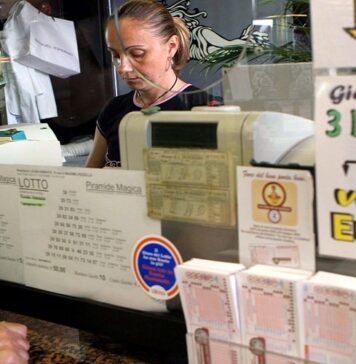
(Jamma) In a motion presented yesterday by the representatives of the M5s Lezzi, Bulgarelli, Bertorotta, Mangili, Molinari, Vacciano, Pepe and Bottici, the pentastellati senators commit the government "in relation to the coverage related to the facilitated settlement of the dispute with the concessionaires for the management of the telematic network of lawful gaming (article 14), to review the conditions to be proposed for the definition, which ensures greater revenue for the treasury, in consideration of the amount of the credit claimed, ascertained by sentence of the Court of Auditors, to in order to limit the financial damage to the state coffers as much as possible".
the senate,
given that:
– to inform Parliament on the financial effects on public finance balances resulting from the financial measures adopted with the decree-law of 31 August 2013, n. 102 "Urgent provisions on the subject of IMU, other real estate taxation, support for housing policies and local finance, as well as redundancy fund and pension treatments", by virtue of the provisions of article 10-up to, paragraph 6, of the law n. 196/2009, accounting and public finance law, the Government presented the Report in question;
– the aforementioned measures impact on an economic framework characterized by a contraction in the first quarter of GDP growth to the extent of 0,6 percentage points, higher than that envisaged in the Economic and Financial Document, equal to -1,3 per cent for the 2013. In case the trends negative recorded in the first quarter, the rate of decline in GDP in the current year would worsen to -1,8 per cent;
– the Report informs that, according to the latest ISTAT surveys, the trends of GDP growth, which recorded a contraction of only 0,2 per cent in the second half of the year, a symptom of a process of progressive stabilization of the economic cycle, while the need to adopt measures to relaunch the economy and to counter the drop in demand for goods and services, which turned out to be worse than expected, caused by the rigid fiscal consolidation policy adopted in 2012 by the previous technical government;
– the measures introduced with the decree-law n. 102 in addition to the already announced cancellation of the first IMU installment for properties, which had benefited from the suspension referred to in law decree no. 54 of 2013 and further IMU concessions for some categories of properties and taxpayers, provide for:
a new issue of public debt up to a maximum of 10 billion euros for the current year to expand the resources allocated to the payment of past debts of the PA to supplier companies;
a further allocation of 500 million euros to finance the redundancy fund;
the allocation of funds to support redundant workers, who have opted for individual dismissal;
housing policy measures, through the allocation of resources to encourage the purchase of the first home, support for innocent tenants in difficulty for the payment of rents, subsidized financing of mortgages for the purchase of the first home with the intervention of the Cassa Deposits and Loans, authorized to make an injection of liquidity in favor of the credit institutions, which will adhere to the initiative, the further reduction of the rate of the dry coupon from 19 to 15 per cent applied to contracts with an agreed fee;
– according to the analysis carried out by the Government, the additional amount of debt payments by the PA will lead to an increase in GDP growth of 0,1 per cent in 2013, to 0,2 per cent in 2014, as well as effects of higher growth in consumption and investments compared to forecasts related to payments authorized by decree-law no. 35 of 2013;
– the measures adopted involve financial charges equal to 2.934,4 million euros for 2013, excluding charges caused by paragraph 6 of article 9, equal to 553,3 million euros for 2014 and 617,1 million euros for 2015;
– it should be noted that a portion of the cost, equal to 1.525 million euros for 2013, is covered through the increased revenue estimated at 600 million euros, consequent to the settlement of the dispute with the concessionaires for the management of the telematic network of lawful gaming (article 14) and 925 million euros, which should come from the higher payments of the value added tax, which it is assumed that the supplier companies of the PA will pay following the higher payments of the debts established by article 13;
– in this regard, it is believed that the aforementioned revenues cannot be considered reliable hedges in quantum, also due to the fact that the same Government inserts in paragraph 4 of article 15 the safeguard clause, provided by the accounting and public finance law n. 196 of 2009, a clause that is absolutely inconsistent with the objectives of supporting and growing the economy, as on the one hand new public debt is issued to pay for previous supplies and support businesses in difficulty due to lack of liquidity, on the other , in the event of the expected lower revenues, the Minister of Economy and Finance may order by November 2013 a further increase in the amount of IRES and IRAP advances to be paid by companies, compared to what has already been recently established with the decree- law n. 76 of 2013;
– furthermore, the safeguard clause also provides for any increases in excise duties, which would lead to an inevitable increase in the prices of goods and services, and this will reduce the effects of the reduction in the tax burden related to the abolition of the IMU for 2013 on first homes. The same adverse effect to the reduction in the tax burden brought about by the abolition of the IMU on first homes, which the Government has announced it will implement from 2014, will be the introduction of the "service tax“, which for obvious reasons will have to ensure the Municipalities the same revenue as the suppressed IMU;
– consider, among other things, that while agreeing with the abolition of the IMU for 2013 on properties intended for main residences, with the sole exclusion of properties of great value, part of the burden of this measure, in a context economic and financial still highly critical and unpredictable, will fall on the production system, where the aforementioned safeguard clause will be activated;
– other financial coverage, equal to 300 million euros for the year 2013, consists of linear cuts in intermediate consumption and gross fixed investments of the central administrations, a type of coverage on which the Government usually expresses its negative opinion during the work of the Commissions parliamentarians, from the beginning of the legislature, if proposed to cover amendments presented by political forces, especially the opposition;
– for a portion of the burden equal to 675,8 million euros for 2013, the coverage is given by the cuts in expenditure authorizations distributed among the estimates, including critical ones, such as contributions to the plant account for the national railway network for 200 million euros. Also in this circumstance, the discretion of the Government to be able to cut appropriations for the legal authorizations is highlighted, with a measure of necessity and urgency, without waiting for an overall evaluation and rationalization of the budgetary resources, as the times for the opening of the session are near budget with the presentation of the stability law for 2014;
whereas:
– overall it is evident that the provisions adopted with the decree-law in question, in particular the abolition of the first installment of the IMU, already suspended, lead to difficulties in obtaining financial coverage, endangering the sustainability of public finance balances;
– it is clear that the forcing carried out with the measures adopted is the result not of a responsible economic-financial policy, aimed at economic recovery, but the forced response to the requests of a part of the majority of the Government for the survival of the same,
commits the Government:
on the occasion of the examination of the provision in the joint Commissions of merit, to evaluate the proposed coverages, so that their reliability is ascertained, to avoid the activation of the safeguard clause, which would operate a further increase in the tax burden both for individual taxpayers , both at the expense of companies;
to avoid, also allowing changes to the content of the decree-law n. 102 of 2013, to adopt measures to reduce the tax burden offset by the increase in taxes other than the reduced ones, effectively canceling the overall reduction in the tax levy;
to review the safeguard clause, referred to in paragraph 4 of article 15, concerning the possible increase in the amount of the IRES advance, which, already increased from 100 to 101 per cent by article 11, paragraph 20, of the decree- law n. 76 of 2013, recently approved, takes the form of a "forced loan" of liquidity to the State at the expense of companies, without interest being paid;
to impartially evaluate the coverage of the amendment proposals of the other political forces, if homogeneous and compliant with those proposed by the Government, to allow that the rejection or approval of the same are the result of the political will expressed by the members of Parliament, without the influence of the unfavorable opinion of the Government representative;
on the occasion of the adoption of further measures on tax matters during the budget session, to favor the adoption of less incisive but suitably covered measures to reduce the tax burden and which do not jeopardize compliance with the objectives of fiscal consolidation, and, moreover, have as their concrete purpose effects of more equitable redistribution of the tax burden between taxpayer groups, in order to respect the principle of progressive taxation enshrined in the Constitution;
to avoid recourse to the emergency decree, to introduce significant "extraordinary" changes to the tax legislation, in consideration of the opportunity for a broad parliamentary debate on the new tax system, and in particular, on the reorganization of the taxation of real estate assets, also in reason for the simultaneous examination by the Finance Commission of the fiscal delegation to the Government;
in relation to the coverage related to the facilitated settlement of the dispute with the concessionaires for the management of the telematic network of lawful gaming (article 14), to review the conditions to be proposed for the settlement, which ensures greater revenue for the treasury, in consideration of the the amount of the claimed credit, ascertained with a sentence of the Court of Auditors, in order to limit as much as possible the financial damage to the state coffers.










